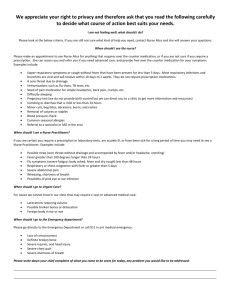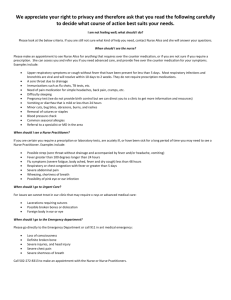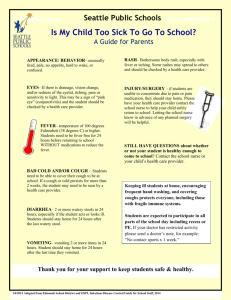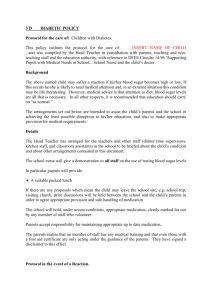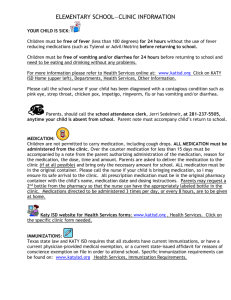Information for the Simulated Patient
advertisement
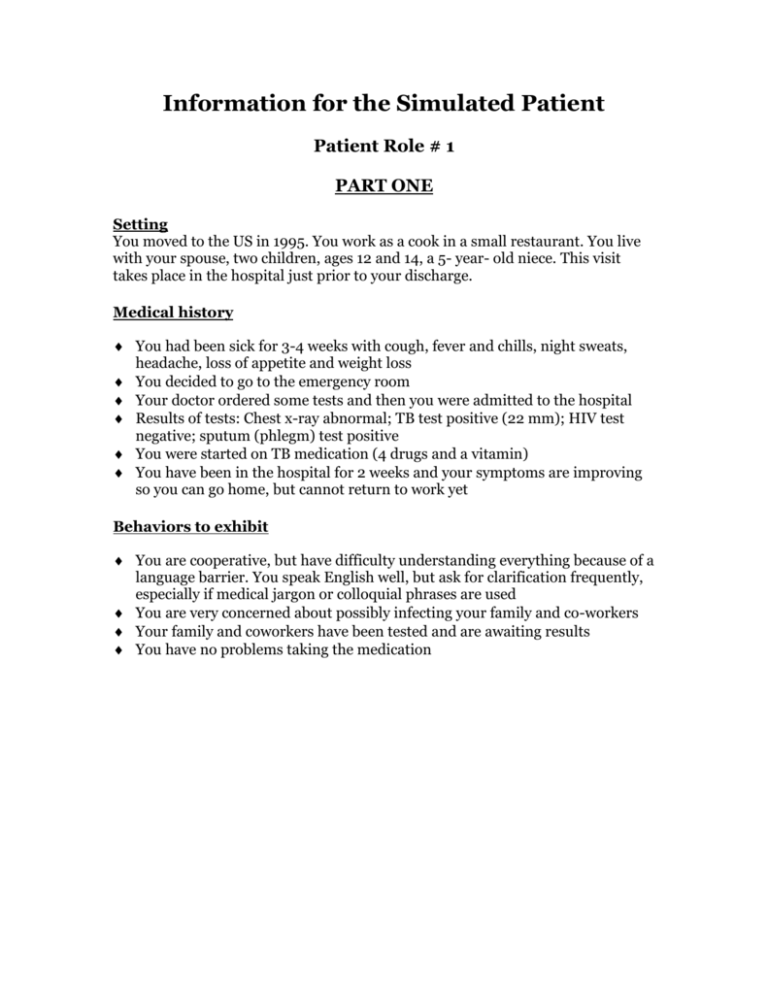
Information for the Simulated Patient Patient Role # 1 PART ONE Setting You moved to the US in 1995. You work as a cook in a small restaurant. You live with your spouse, two children, ages 12 and 14, a 5- year- old niece. This visit takes place in the hospital just prior to your discharge. Medical history You had been sick for 3-4 weeks with cough, fever and chills, night sweats, headache, loss of appetite and weight loss You decided to go to the emergency room Your doctor ordered some tests and then you were admitted to the hospital Results of tests: Chest x-ray abnormal; TB test positive (22 mm); HIV test negative; sputum (phlegm) test positive You were started on TB medication (4 drugs and a vitamin) You have been in the hospital for 2 weeks and your symptoms are improving so you can go home, but cannot return to work yet Behaviors to exhibit You are cooperative, but have difficulty understanding everything because of a language barrier. You speak English well, but ask for clarification frequently, especially if medical jargon or colloquial phrases are used You are very concerned about possibly infecting your family and co-workers Your family and coworkers have been tested and are awaiting results You have no problems taking the medication Information for the Simulated Patient Patient Role # 1 PART TWO Setting This visit takes place in your home two weeks after hospital discharge. You are on DOT (directly observed therapy). A nurse/field worker comes to your home every day with your medication and watches you take the pills You ask the DOT worker to give you a four-day supply of TB medication because you have to go out of state with your spouse. Your spouse is required to appear at an Immigration Office to get a green card You want to go back to work soon Information for the Simulated Patient Patient Role #2 PART ONE Setting You are an adult who has been living in a homeless shelter for the past five years. Medical History Diagnosed three years ago with “walking pneumonia.@ At same time, you had HIV testing and were found to be positive (probably from a sexual encounter). Currently on HIV medications One month ago you were hospitalized for fever, cough, weight loss, fatigue, and night sweats Chest x-ray results were abnormal. Diagnosis of tuberculosis was made You are being treated for tuberculosis with four medications You complained of mild nausea and decreased appetite when you were in the hospital This is your first clinic visit since the hospital discharge three days ago. Outreach worker finally tracked you down and brought you in to clinic for follow up. Behaviors to exhibit You are not very good with taking your HIV meds. Now you are expected to take four different kinds of TB meds as well. You are feeling overwhelmed You are not happy about being Abrought into clinic@ by the outreach worker You think you had side effects from the TB medicine (nausea and decreased appetite) when you were in the hospital Other than the mild nausea and decreased appetite, you are feeling better (no more night sweats or fever and you have more energy) and wonder if all this medicine is really necessary You become angry about people around you at clinic (and in the hospital when you were there) wearing masks Information for the Simulated Patient Patient Role #2 PART TWO Setting This visit takes place at the TB clinic four weeks later. A nurse or outreach worker brings you your medicine three times a week and observes you taking it (DOT = directly observed therapy) You have missed a few DOT appointments. You do not like others knowing your business and the medicine gives you nausea Field worker convinces you to come to the clinic to talk to the nurse case manager today. You show up without an appointment You are still having some nausea. No vomiting or dark urine (if they ask) Your cough is improving; no fever Tell the nurse that you might not be able to continue staying at the shelter (you have reached maximum amount of time allowed) Getting decent food is a problem. You do not think you have gained any of the weight that you lost. Your clothes are still a little baggy You find it difficult to keep your clinic appointments straight (TB clinic, HIV clinic) and you are having trouble with transportation to these appointments Note: If all these issues do not get mentioned, it is acceptable. Information for the Simulated Patient Patient Role # 3 PART ONE Setting You have been diagnosed with TB on two previous occasions, but you have not completed treatment for TB. You did not take the medications as prescribed and the local TB program was unable to locate you for follow up. You work as a flight attendant. Today you are at the clinic for your first follow-up visit since your hospital discharge. You need medical clearance to return to work. Your supervisor knows about the diagnosis of TB. Medical history You were diagnosed with TB two years ago with when you had cough, fever, weight loss, and fatigue – TB skin test, chest x-ray, and sputum (phlegm) were all positive for TB – You were started on medication, but stopped when you started feeling better (after one month) One year later, you experienced the same symptoms – You received same tests (with exception of the TB skin test), diagnosis, and started on treatment – You stopped taking the medicine after two months (you felt better and it was a hassle getting medication refills) One month ago, you started having similar symptoms, and again a diagnosis of tuberculosis was made – Treatment includes four anti-tuberculosis medications that you have been receiving via DOT (Directly Observed Therapy). An outreach worker brings the medication to your house 5 times a week and watches you take the pills. You take it on your own on the weekend – Your cough has improved, you have gained 5 lbs., and your sputum tests are negative Behaviors to exhibit You are not happy about talking to the nurse, but the only way you can return to work is with written clearance. If the nurse is empathetic, you should respond in a positive way You resent having to receive DOT even though the outreach worker is nice and you have lots of questions about scheduling DOT when you return to work. As a flight attendant, you may be out of town for up to one week at a time, flying through different time zones Information for the Simulated Patient Patient Role # 3 PART TWO Setting This encounter takes place one month later at the clinic. You received a letter from the nurse case manager asking you to come to clinic today You are told that you are “resistant” to 2 of the 4 drugs you are currently taking and will need an injectable form of medication (you are not sure what this means) You are vague about your work schedule as it relates to scheduling DOT When nurse tells you about the need for CT scan, you argue that your insurance will not cover it Information for the Simulated Patient Patient Role # 4 PART ONE Setting You are a “stay at home” parent/grandparent. You live with your spouse and young child/grandchild in a two-family house. Your relative lives in the first floor apartment and will help with child care while you are recuperating. You are very active in your community (civic organizations, church groups, etc.). This visit takes place in the hospital where the TB nurse case manager plans for your care after hospital discharge. Medical History You had a fever for 1 week. Your fever went down after taking Tylenol, but it rises again after 2-3 hours Your cough started about 6 weeks ago. You are using cough drops, but recently started coughing up phlegm (dark yellow color) You have had weight loss of approximately 10 lbs over a 3 month period of time You have been told that your diagnosis is tuberculosis (based on positive chest x-ray, positive TB skin test (Your TB test in the past was negative), and positive sputum smear (test of phlegm) Treatment was started 10 days ago with four kinds of medications. Your fevers have stayed down without taking Tylenol Behaviors to exhibit You try to be cooperative about giving information You are anxious to find out how and where you got TB You do not know very much about TB, but you want to know more You are very concerned about being contagious, especially as it relates to your child You are concerned about confidentiality. You think the health department personnel may say something about your TB diagnosis to friends or neighbors You feel guilty about not recognizing that your symptoms were related to TB. You thought your cough was due to seasonal allergies and weight loss was due to dieting Information for the Simulated Patient Patient Role #4 PART TWO Setting This visit takes place at your house. You left the hospital 2 days ago, against your doctor’s advice. You left the hospital because your relative was injured during a fall and will not be able to help with your child You found this out shortly after the nurse visited you in the hospital You are cooperative, but now even more concerned about others in community finding out that you have TB You are still unsure how and where you got TB Your cough is a little better but you are still coughing up phlegm You feel very weak Information for the Simulated Patient Patient Role #5 PART ONE Setting You are a previously healthy person who works as a school bus driver from 6:00 am to 8:30 am and from 2:30 pm to 5:00 pm Monday through Friday. You are a single parent living with your child. This visit takes place in the hospital. Medical History You have a history of asthma You have had a persistent cough for 1 month; 2 weeks ago, cough worsened and was accompanied by phlegm You have had a fever of about 100˚ F for one week You had some weight loss but you do not know the exact amount Three years ago, you had a positive TB skin test; chest x-ray was negative. No medications prescribed because your doctor said you were over 35 years of age and did not need them Four days ago you began feeling sick (fever and cough) and started having a problem with asthma. You went to the ER because you were unable to schedule an appointment with your private doctor and were admitted to hospital. A chest x-ray revealed abnormalities Your sputum smears were positive for TB Treatment for TB was started 2 days ago Behaviors to exhibit You are anxious to get back to work and worried you might get fired if boss finds out that you have TB You are concerned about spreading TB. The windows on the bus are always shut because students ‘fool around” and throw things out the windows You do not know much about TB, but you are willing to listen if nurse tries to explain your diagnosis. Hospital personnel have been using a lot of confusing medical terminology You have questions about medication: Why 4 drugs? Why is treatment so long? Why wasn’t I treated when I first had a positive TB skin test three years ago? Information for the Simulated Patient Patient Role #5 PART TWO Setting This visit takes place 10 days later. You are ready for discharge from the hospital. Nurse case manager is talking about providing “directly observed therapy” (DOT). She explains that someone will observe you taking your TB pills all at once. You really do not like the idea of being “watched over” You need to get back to work You realize now that you have poor insurance coverage because you work part time Most of your symptoms are better now. Asthma still a problem Information for the Simulated Patient Patient role # 6 PART ONE Setting You are a nurse who recently had a TB skin test as part of a pre-employment physical for work in a home health agency. You were born in England and moved to the U.S. at age three. Today you are at the clinic to follow-up your positive skin test. The physician examines you and prescribes INH (isoniazid, an anti-TB medication) for 9 months. Now you are meeting with the nurse case manager. Medical History Received BCG vaccine (this vaccine is not used in the U.S., but many people born outside the U.S. receive it and think it prevents people from getting TB) as a child and was told that any TB skin tests in the future would be positive because of this vaccine This is the first time you have had a TB skin test The home health agency insisted that you have a skin test and the results were positive You have no known exposure to person(s) with TB You do not have any medical problems A chest x-ray was done soon after positive skin test results and it was normal Behaviors to exhibit You are convinced that the positive skin test is due to BCG vaccine You refuse to take the medication recommended. You have known people who got sick from TB medication (for example, nausea, problems with liver) You are annoyed, defensive, and afraid that you will not get the agency job because of the positive TB skin test After much deliberating, you agree to take the TB medication and return to clinic every month. You are still not convinced that you need the medication Information for the Simulated Patient Patient role # 6 PART TWO Setting This encounter takes place one month later at a follow-up visit. The nurse case manager interviews you and will dispense a month supply of INH The nurse will ask you questions about possible side effects of the medication. Be very vague at first and then admit to not taking the medication at all. You still think that there is no need for you to be treated The requirement for TB testing and medical evaluation has been met so you have started the job with the home health agency. Taking the medication is not required but highly recommended If the nurse is convincing and you feel comfortable with his/her recommendations, you can agree to take the medication
